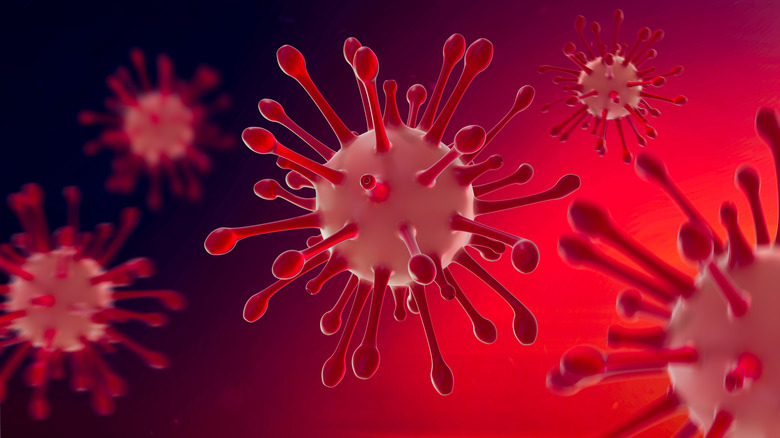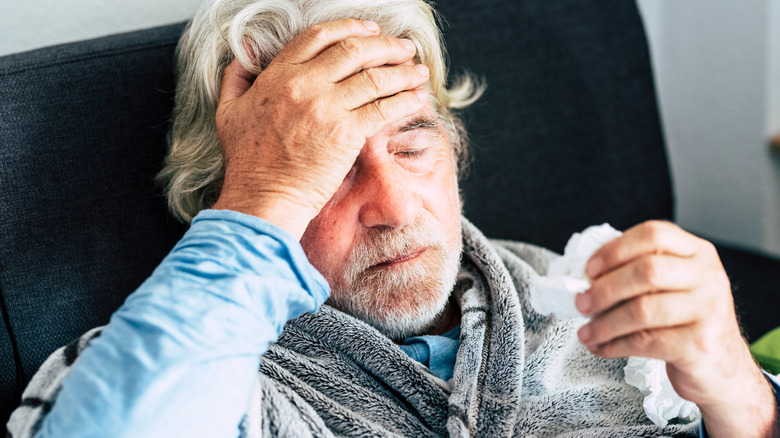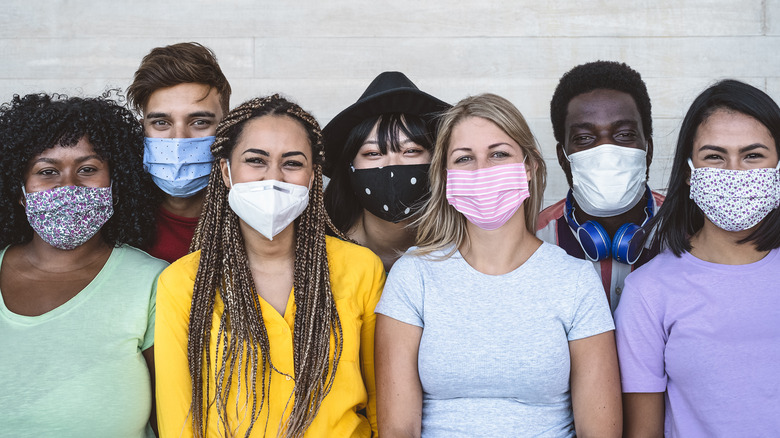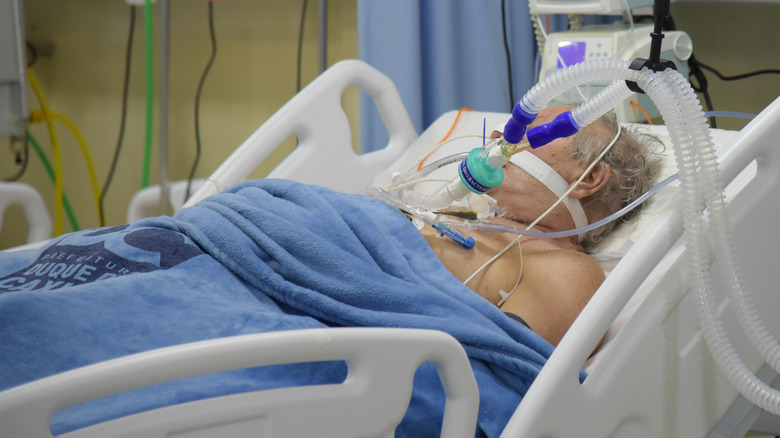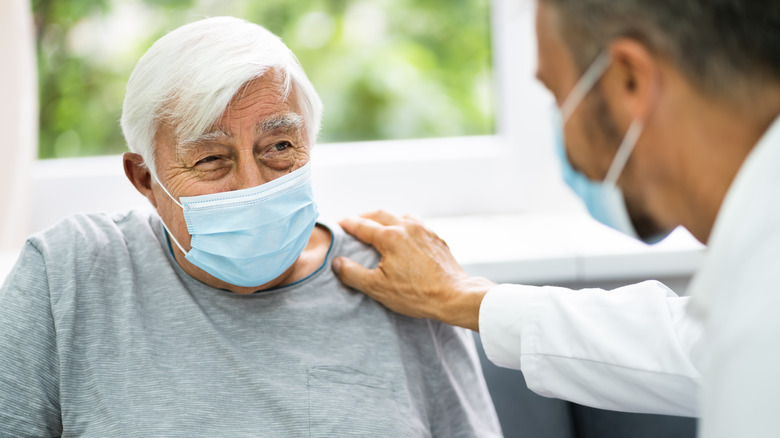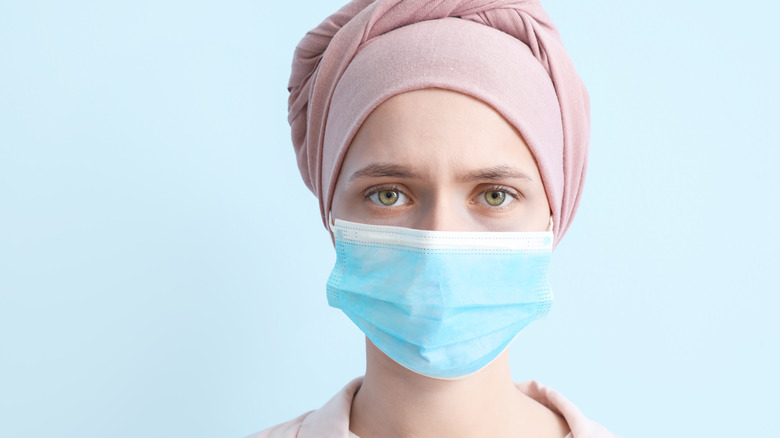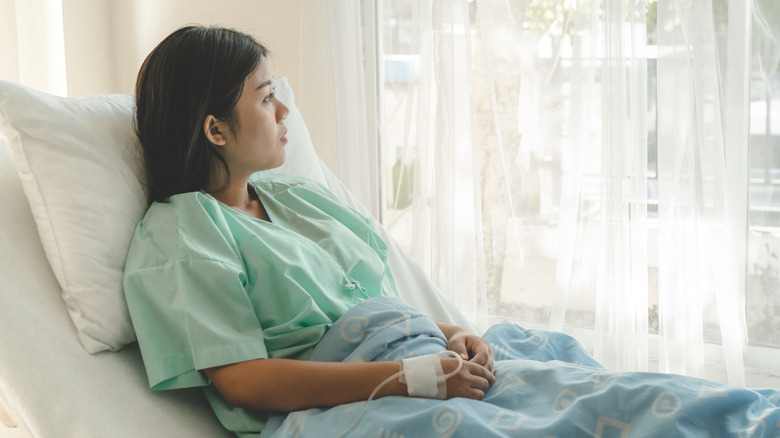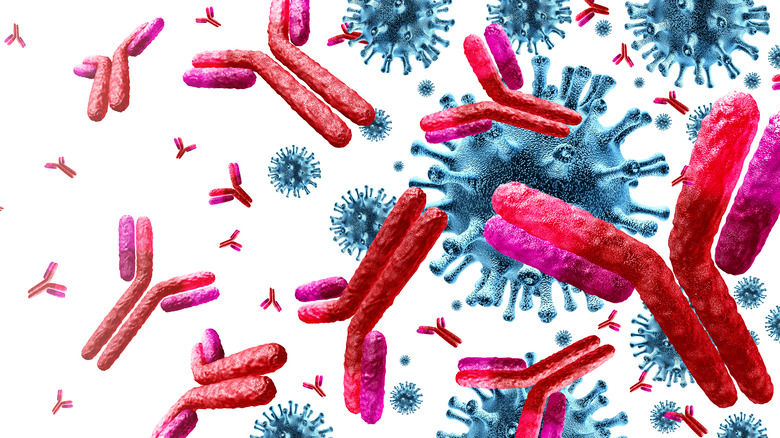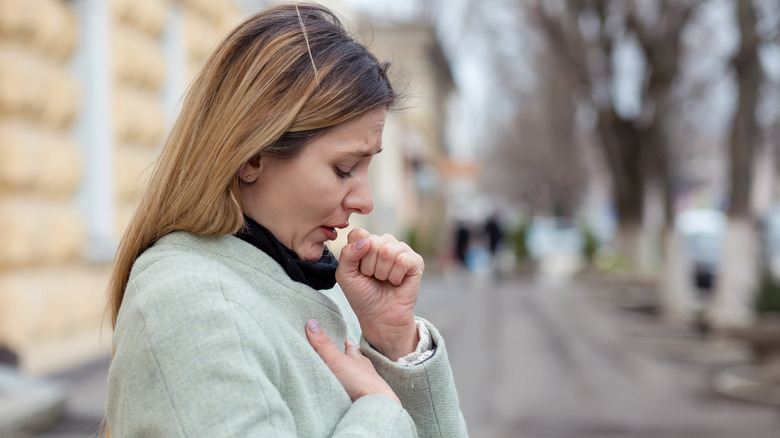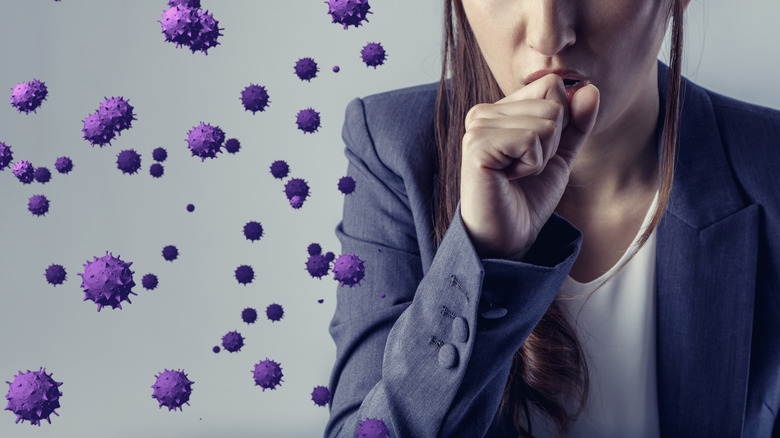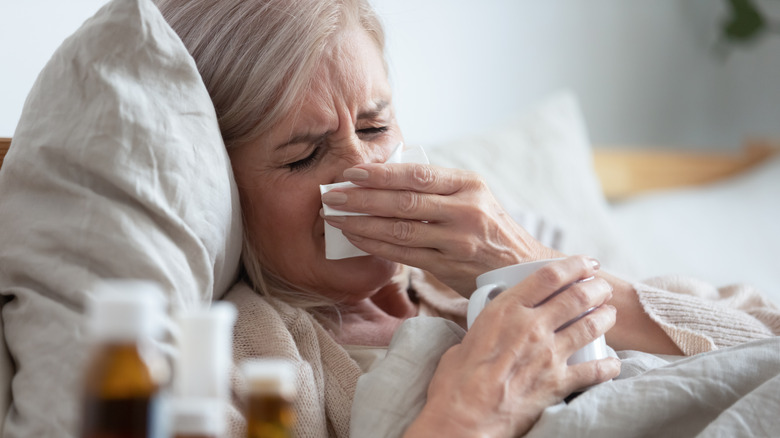Everything You Need To Know About Breakthrough COVID-19 Cases
Breakthrough cases, which are defined by Johns Hopkins Medicine as "an infection with a virus, bacterium or other germ after you have been vaccinated," are all over the news and the internet. Breakthrough COVID-19 infections, in particular, occur "when someone who has been fully vaccinated for COVID-19 becomes infected with the SARS-CoV-2 coronavirus," explained Johns Hopkins.
If you spend any time on social media, you may be under the impression that breakthrough COVID-19 cases are really common. But, of course, no one is talking about how they didn't get a breakthrough infection. And unfortunately, reading anecdotal reports about breakthrough cases may make some people wonder if they should even bother to get vaccinated. The truth about breakthrough COVID-19 cases is a lot more complicated than what you're likely seeing in the news and on your social media feeds. Let's take a look at everything you should know about breakthrough COVID-19.
No vaccine is 100% effective
The Holy Grail of vaccine-making would be to create a formula that is 100% effective at preventing infection. The reality is, however, that vaccines never actually get there. The closest vaccine to 100% efficacy is the rabies vaccine, as long as administered properly (via Patient).
This isn't true for most other vaccines. Most vaccines can not promise near-total protection against infection and they don't necessarily prevent transmission. That is simply a reality of medicine — not everyone is going to react to a vaccine the same way and have the same immune response (via MedRxiv). This makes it very, very difficult to design a vaccine that is just as effective for a 20-year-old as it is for an 80-year-old.
While the ultimate goal of any vaccine campaign is to prevent a large number of people from getting sick and spreading the virus to others, that's not the only value in getting vaccinated against COVID-19. Vaccinated people who do get breakthrough infections are less likely to become very ill or die, according to Johns Hopkins Medicine, which is obviously a pretty important benefit.
Breakthrough infections are uncommon
If you scour the internet too long, you'll probably walk away thinking everyone and their pet cat has had a breakthrough COVID-19 infection. In fact, rumor mills have spread the notion that the majority of COVID-19 cases are being seen in fully vaccinated people — but is it true?
This rumor likely stemmed from a study that found that 74% of people who got COVID-19 during a summer outbreak in Barnstable County, Massachusetts were fully vaccinated (via CDC). On the surface, that looks bad for vaccines, but it's not as simple as "74% of people who get COVID-19 are vaccinated." The CDC noted, "As population-level vaccination coverage increases, vaccinated persons are likely to represent a larger proportion of COVID-19 cases." There could be other factors at play, too. Most of the Barnstable spread happened at large, public gatherings, and it's possible that unvaccinated people avoided those events.
The larger point is what the statistics say. According to MIT, breakthrough infections happen in somewhere between .02% to .1% of vaccinated people. This means your chance of getting COVID-19 falls way, way down once you've had both doses of the vaccine.
Deaths among fully vaccinated people are not very common
As of mid-October 2021, 6,617 fully vaccinated people in the United States have died from COVID-19, according to the Centers for Disease Control and Prevention. To put this into perspective, Forbes reported that around the same time, there'd been roughly 353,000 COVID-19 deaths in the United States since the beginning of 2021. That means only a small fraction of deaths were in vaccinated people.
According to health experts who spoke with CBS 13 News, the percentage of people who've died from COVID-19 after being fully vaccinated is about 1.3%. "Even when a vaccine is highly effective, a small percentage of people who are fully vaccinated will get COVID-19 if they are exposed to the virus that causes it," epidemiologist Shannon McBee confirmed to the outlet.
Nevertheless, this small percentage is pretty solid evidence that even though breakthrough infections can happen, they're much less likely to kill you. And, ultimately, that's quite an important reason to get vaccinated!
Vaccinated people are less likely to be hospitalized
Being in the hospital isn't fun, and being put on a ventilator is even worse. But apart from your own personal discomfort, the hospitalization of large numbers of COVID-19 patients creates a lot of other problems.
One of the most important is that it strains valuable resources away from all patients. Other health problems don't just go away just because COVID-19 is a big deal now. When the ICUs fill up with COVID-19 patients, there's less room for accident victims, heart attack patients, people with appendicitis, and other emergency cases. Overtaxed hospitals may not schedule routine surgeries and may even have to postpone life-saving surgeries (via NBC News).
Unvaccinated people still make up the largest percentage of COVID-19 hospitalizations. According to the CDC, unvaccinated people are around 12 times more likely to end up in the hospital than unvaccinated people. Getting vaccinated is not just in your best interest — it's in everyone's best interest.
The data don't really give us a clear picture
Unfortunately, the numbers alone aren't really enough to give us a clear picture of the actual risk to people who are fully vaccinated. The Kaiser Family Foundation (KFF) published a report in July noting that many deaths and hospitalizations happened alongside COVID-19 infections, and not because of them. For example, a person who went to the hospital for a broken pelvis might have received a positive COVID-19 test after they were admitted.
It might seem like this would be uncommon, but the data say otherwise. When the CDC released this data back in July, there were 5,601 hospitalizations in fully vaccinated people, and 27% of those people were asymptomatic, which suggests that the hospitalization was not related to COVID-19. Of the 1,141 fatalities, 26% were asymptomatic (via KFF). Most hospitals only report the number of hospitalizations and fatalities in people with COVID-19, but fail to say whether or not COVID-19 is the cause.
Older people are more likely to get breakthrough COVID-19 infections
At times, reports of breakthrough COVID-19 infections leave out important details. A big one is that the risk of infection isn't the same for everyone who has had the vaccine. Some people are more vulnerable to getting a breakthrough infection. According to the CDC, the median age for death in fully vaccinated people is 82, which means that elderly vaccinated people are much more likely to die from COVID-19. That's not meant to trivialize deaths in the elderly population. Instead, this illustrates that the risk is not the same across the board. Even so, the CDC reports that people 65 and older are still about 9 times less likely to be hospitalized than unvaccinated people in this group.
According to a CDC epidemiologist who spoke to The New York Times, older people may be more vulnerable to breakthrough infection because they have weaker immune systems. So even though an older person is vaccinated, that person's immune system may not mount a strong enough defense to fully protect them from the virus when they encounter it. That is, unfortunately, a side effect of aging, not a problem with the vaccine itself.
Immunocompromised people are also vulnerable
Another group that is vulnerable to severe disease and death even after vaccination is the immunocompromised. An immunocompromised person is someone whose immune system doesn't function as well as it should, whether that's because of underlying disease or treatment for a disease like cancer. People taking immunosuppressant drugs after organ transplant also fall into this category (via Penn Medicine).
The reason why this group is more vulnerable even after they've been fully vaccinated is obvious — when you are immunocompromised, your immune system doesn't work as well, which means it's not going to mount a strong defense after exposure to the COVID-19 vaccine. That means fewer antibodies ready to combat the SARS-CoV-2 virus when the body encounters it, per Penn Medicine.
This is the reason why the CDC is now recommending additional booster shots for people who are immunocompromised. The hope is that the additional booster will be enough to kick the immune system into a higher gear.
The delta variant is fueling breakthrough infections
In early 2021, Pfizer and Moderna's vaccines maintained around 90% efficacy (via Stat News). However, these vaccines were developed before the delta variant became the dominant strain. A CDC study published in August found that the effectiveness of the vaccine against infection by the delta variant lowered to around 66%.
According to University of Iowa Health Care, delta replicates faster and is present in larger amounts in the nose and throat, so if you're exposed to it, you're likely to receive more virus particles than you would if exposed to the original version of the virus. In some fully-vaccinated people, delta replicates so fast that the immune system doesn't have a chance to respond before the onset of symptoms (via Nature). That's also a reason why breakthrough cases tend to be mild. The immune system is slow to catch up, but when it does it's able to mount a strong defense.
'Long COVID' is less common in people who've had breakthrough infections
Some people have COVID-19 symptoms for a week or two. Other people have what's known as "long COVID," which is the term used to describe cases in which COVID-19 itself resolves but the patient continues to experience symptoms. According to Diabetes & Metabolic Syndrome: Clinical Research & Reviews, COVID-19 long haulers may experience symptoms that last for weeks or even months. There may be permanent damage, too. According to Respiratory Medicine, COVID-19 can cause permanent damage to the lungs, and American Journal of Otolaryngology says it can also cause permanent cardiovascular damage.
The good news? A Lancet study found that vaccinated people had a significantly reduced risk of developing long COVID. In fact, the vaccine cuts the incidence of symptoms lasting longer than 28 days roughly in half. On a related note, some people who have had long COVID prior to getting vaccinated report an improvement in their symptoms after receiving the vaccine (via Yale Medicine).
Breakthrough infections in other groups
There have certainly been breakthrough infections in people who do not fall into those higher-risk groups. A study published in the New England Journal of Medicine looked into why this might be, and what they found was fairly predictable.
In a group of vaccinated health care workers at a large hospital in Israel, researchers discovered that fully vaccinated workers who did get COVID-19 had fewer neutralizing antibodies than the people who did not. This means that their immune systems simply did not mount a strong defense when they received the vaccine, so their bodies produced fewer neutralizing antibodies and weren't able to completely overcome the virus when they encountered it.
This could happen for a number of reasons. Everyone's body is different, so not everyone is going to have the same response to a vaccine. The CDC also notes the importance of correct vaccine storage and administration, which means human error could play a role, too. A booster shot provides added immunity, which is a great reason to get one as soon as it becomes available to you.
Waning immunity plays a role
Waning immunity is something else that's been in the news. Unfortunately, it doesn't just seem to be paranoia — a study in the New England Journal of Medicine found that the vaccine had a very high rate of efficacy (90%) between March and June of 2021, but that the efficacy had dropped off to around 65.5% by July.
Although the vaccine is still very good at preventing hospitalization and death, a preprint Public Health England study found that about 20 weeks after vaccination, those risks increase a little bit, too. Still, the increase is not significant enough that anyone is recommending boosters for the average, healthy person. Not yet, anyway. This is not true for higher risk groups, though. If you are over the age of 65, immunocompromised, have underlying health problems, or work in the healthcare industry or other high-risk settings, you are eligible for a booster today (via CDC).
When you have a breakthrough infection, you can spread the virus to others
For a while, scientists weren't sure if people who got breakthrough infections could still transmit the virus to other people. Today we know that not only can fully-vaccinated people with breakthrough infections spread COVID-19, they have just as much virus in their bodies as unvaccinated people do (via Johns Hopkins Medicine). This means vaccinated people who have COVID-19 are equally as infectious as unvaccinated people who have COVID-19.
It is important to keep this in perspective, though. While, to some, it may seem like a reason to avoid the vaccine, know that vaccines are still very effective at preventing infection. So while vaccinated people who are sick with COVID-19 can spread the virus just as easily as unvaccinated people, fully vaccinated people are a lot less likely to get COVID-19 in the first place and are therefore much less likely to spread it around.
Help prevent breakthrough cases by wearing a mask
It's pretty great to know that you don't have to worry nearly as much about hospitalization and death as you did before you got vaccinated. But we don't want to sugarcoat this. Even a mild case of COVID-19 can feel pretty awful. Writing for NPR, Will Stone described a fever of 103, aching limbs, and fatigue rivaling a bad case of the flu. He also explained he did not feel fully recovered until almost a month after the onset of symptoms.
For the most part, doctors consider mild COVID-19 to be anything that doesn't require hospitalization. So let's just say you don't want to get even a breakthrough infection of COVID-19 if you can avoid it. This is a good reason to continue wearing masks.
In fact, the CDC recommends that you wear masks indoors and avoid large public gatherings regardless of your vaccination status. Even though they may only be a small chance that a fully vaccinated person will develop a case of breakthrough COVID-19, you can make that small chance even smaller by following the same precautions you followed early in the pandemic. Mask-wearing can also protect those around you, limit the spread, reduce the number of cases, and lift some of the pressure on hospitals (via BBC).
